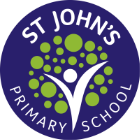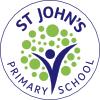English
English Curriculum Intent
We aim to ensure that every child at St John’s:
- is a confident user of both oral and written English, with a wide vocabulary to draw upon
- develops a positive attitude towards reading, writing, speaking and listening
- reads widely, for pleasure and for learning
- has access to a broad, balanced and creative English curriculum
- has clear, consistent, high-quality English teaching which enables them to succeed
Implementation
At St John’s, we develop oral language skills and vocabulary development by:
- using the ‘Word Aware’ approach to plan curriculum content in EYFS
- using Concept Cat from Word Aware within EYFS.
- using role play and drama activities
- providing children with talk partners in lessons to discuss their thoughts and ideas
- providing opportunities for performance, for example, class assemblies or presentations between classes
- giving opportunities for debates and discussions
- teachers and other staff modelling correct use of spoken English
- liaising with Speech and Language therapists and providing interventions for those children requiring extra support (see SEN policy)
- ensuring that children with English as an Additional Language develop their English language skills, whilst continuing to develop their home language (see E.A.L policy)
We develop children’s reading skills by:
- teaching a range of strategies to allow children to read accurately and fluently, including the discreet teaching of phonics. At St John’s, children begin their phonological journey in Nursery, and for the first term in Reception, with Phase 1 of Letters and Sounds which develops their general sound discrimination, rhythm and rhyme, and leads to oral blending and segmenting. In the remainder of Reception, Year 1 and Year 2, we use the Essential Letters and Sounds (ELS) Phonics program
- providing developing readers with book banded books which are closely matched to their stage of development
- promoting daily reading practice at home using the ‘Let’s Get Reading’ scheme
- having daily guided or whole class reading sessions to develop reading and comprehension skills
- giving individual reading targets to children
- providing children with other books to read in school and take home to build their skills in book selection and Reading for Pleasure
- teachers and other staff modelling reading throughout the school day
- classes having allocated reading for pleasure time at least once a week, with teachers modelling their own reading for pleasure
- engaging with parents through workshops and videos to support their knowledge and understanding of how we teach children to read
- creating learning environments that support teaching
We develop children’s writing skills by:
- Using the ‘Transforming Writing’ approach
- using the Nelson Handwriting scheme to allow children to write neatly and legibly
- having clear, focused and sequential learning objectives for each lesson
- teachers modelling writing and the writing process
- having shared and guided writing sessions focusing on specific skills for small groups of children
- teaching children to write for a range of purposes and audiences, and giving them ‘real life’ reasons for their writing e.g. writing a letter to an author or publishing their stories in a class book
- teaching children to write different genres such as stories, reports, letters and poems
- giving individual writing targets to children
- teaching them the skills to edit and improve their writing
- giving them regular opportunities to build fluency and stamina for writing
- providing them with opportunities to write about their interests and develop a love of writing
- giving them the knowledge and strategies to become accurate, confident spellers
- engaging with parents through workshops and videos to support their knowledge and understanding of how we teach children to write
Please click the links in the documents section for more information about the English taught in each year group.
We will be continuing with Transforming Writing within our English lessons. You will see evidence of your child’s progress in their books. ‘Cold’ tasks (which the children write before focused teaching) will be written on blue paper, and ‘Warm’ tasks (which are written after focused teaching) will be on yellow. Please try and come along to our next Parent Book Look so you can look out for ‘cold’ and ‘warm’ writing – your child’s learning and progress will be clear for you to see.

